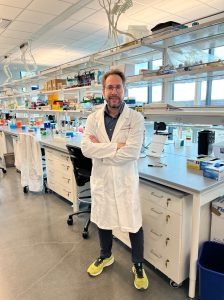Over the past couple of decades, new diabetes cases have tripled in the U.S., and 80 percent of patients with type 2 diabetes eventually succumb to cardiovascular disease. Jaume Padilla, associate professor in the Department of Nutrition and Exercise Physiology (NEP), is working to solve this important problem.
Padilla received his PhD in exercise physiology at Indiana University before he came to the University of Missouri (MU) Department of Biomedical Sciences in 2009 as a postdoctoral fellow.
“I came to MU to work with Harold Laughlin, a world-renowned investigator in exercise vascular biology, and with the goal of expanding my ability to conduct mechanistic vascular research at the cellular and molecular levels using small- and large-animal models,” said Padilla.

In 2013, Padilla joined NEP as an assistant professor and started his own research laboratory. Padilla said he believed NEP, which was then led by Chris Hardin, and MU in general, was the ideal environment to continue growing as a scientist, given the strong departmental support, the collaborative culture at MU, and the distinguished history of research in cardiovascular sciences on campus.
Padilla’s research is focused on understanding the mechanisms underlying vascular dysfunction in the context of physical inactivity, obesity and type 2 diabetes.
“Cardiovascular diseases are the No. 1 killer in the western world,” said Padilla. “So, we need novel therapies.”
He takes a multi-scale and integrative approach by incorporating biochemical and molecular techniques, studies in genetic mouse models and large animals, as well as clinical studies in human participants.
“Findings from one end of the spectrum guide the experiments on the other end of the spectrum and vice versa,” said Padilla.
Padilla, together with Camila Manrique-Acevedo, associate professor in medicine, and Luis Martinez-Lemus, professor in medical pharmacology and physiology, have created a “vigorous and dynamic” vascular research team that recently moved to the newly opened NextGen Precision Health building.
“We are excited to capitalize on such fantastic state-of-the-art facilities with an unparalleled set of resources and instrumentation, all under one roof,” said Padilla.
He explained it was his dream since being a graduate student to be able to conduct mechanistic, basic science experiments alongside human studies in the same space. With the move to NextGen, this dream comes true.
“The move to NextGen will further strengthen and expand the scope of our collaborative basic and translational work and catapult our team toward making ground-breaking discoveries to ultimately prevent and treat cardiovascular disease in diabetes,” he said.
During the last 12 months, the team has received three new multi-principal investigator grants from the National Institutes of Health and Veterans Affairs to study the mechanisms of vascular dysfunction in type 2 diabetes. These projects involve a combination of pre-clinical models and full-fledged clinical trials with the goal of identifying new therapeutic targets and strategies to restore vascular function in diabetes. This successful group of investigators exemplifies the benefits of team science and productive collaboration across departments and colleges.
Padilla currently teaches a graduate course on cardiovascular disease and exercise, which is in great alignment with his research.
He is also an avid marathon runner. When not enjoying time with his family, you can likely find him running on the MKT or streets of Columbia, regardless of the weather.
“Running keeps me sharper at work,” Padilla said.
NEP is a joint program with the School of Medicine. NEP joined the College of Agriculture, Food and Natural Resources (CAFNR) this past summer, forming the Division of Food, Nutrition and Exercise Sciences (FNES).